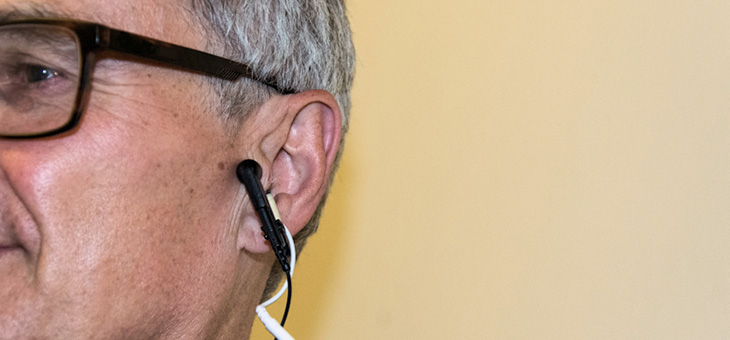A bizarre new therapy has been found to reduce the effects of ageing in over-55s, and also led to wellbeing improvements, including better quality of life, mood and sleep.
‘Tickling’ the ear with a small electrical current rebalances the autonomic nervous system and slows ageing, according to new research conducted at the University of Leeds.
The therapy, known as transcutaneous vagus nerve stimulation (tVNS), delivers a small, painless electrical current to a part of the ear that sends signals to the nervous system. When delivered in short daily doses for two weeks, scientists found positive health benefits, such as those mentioned above. It was also found to protect older people from chronic diseases such as high blood pressure, heart disease and atrial fibrillation. Improving the balance of the autonomic nervous system lowers an individual’s risk of death and minimises the need for medication or hospital visits.
Scientists at the University of Leeds recruited 29 healthy volunteers, aged 55 and over, giving each of them the tVNS therapy for 15 minutes per day, over a two-week period. Participants were taught to self-administer the therapy at home during the study.
The findings, published on Aging, suggest the therapy could help people age in better health by recalibrating the body’s internal control system.
“The ear is like a gateway through which we can tinker with the body’s metabolic balance, without the need for medication or invasive procedures. We believe these results are just the tip of the iceberg, said lead author Dr Beatrice Bretherton.
“We are excited to investigate further into the effects and potential long-term benefits of daily ear stimulation, as we have seen a great response to the treatment so far.”
Image source: University of Leeds
Scientists have long been interested in using electrical currents to influence the nervous system. The autonomic nervous system, in particular, controls bodily functions that don’t require conscious thought, such as digestion, breathing, heart rate and blood pressure.
It contains two branches, the sympathetic and the parasympathetic, which work against each other to maintain a healthy balance of activity.
“The sympathetic branch helps the body prepare for high intensity ‘fight or flight’ activity, whilst the parasympathetic is crucial to low intensity ‘rest and digest’ activity,” says Science Daily.
“As we age, and when we are fighting diseases, the body’s balance changes such that the sympathetic branch begins to dominate. This imbalance makes us more susceptible to new diseases and leads to the breakdown of healthy bodily function as we get older.”
The vagus nerve, which is the longest nerve in the autonomic nervous system, is also the major nerve of the parasympathetic system. It has been postulated that electrical stimulation of the vagus nerve could be used to tackle depression, epilepsy, obesity, stroke, tinnitus and heart conditions.
Usually this kind of stimulation required electrodes surgically implanted in the neck region, but one small branch of the vagus nerve can be stimulated without surgery.
University of Leeds researchers found that applying a small electrical stimulus to the vagus nerve at the ear improves the balance of the autonomic nervous system. This procedure causes a slight tickling sensation, hence the nickname of the therapy.
Researchers are now investigating if this therapy could assist with heart problems and mental health conditions.
“We believe this stimulation can make a big difference to people’s lives, and we’re now hoping to conduct further studies to see if tVNS can benefit multiple disorders,” said Dr Susan Deuchars, one of the study’s senior authors.
Would you ever have guessed that ‘tickling’ could be so beneficial to your health?
If you enjoy our content, don’t keep it to yourself. Share our free eNews with your friends and encourage them to sign up.
Related articles:
Your lifestyle the key to longevity
Simple immune boosters
Never too late to extend your life

